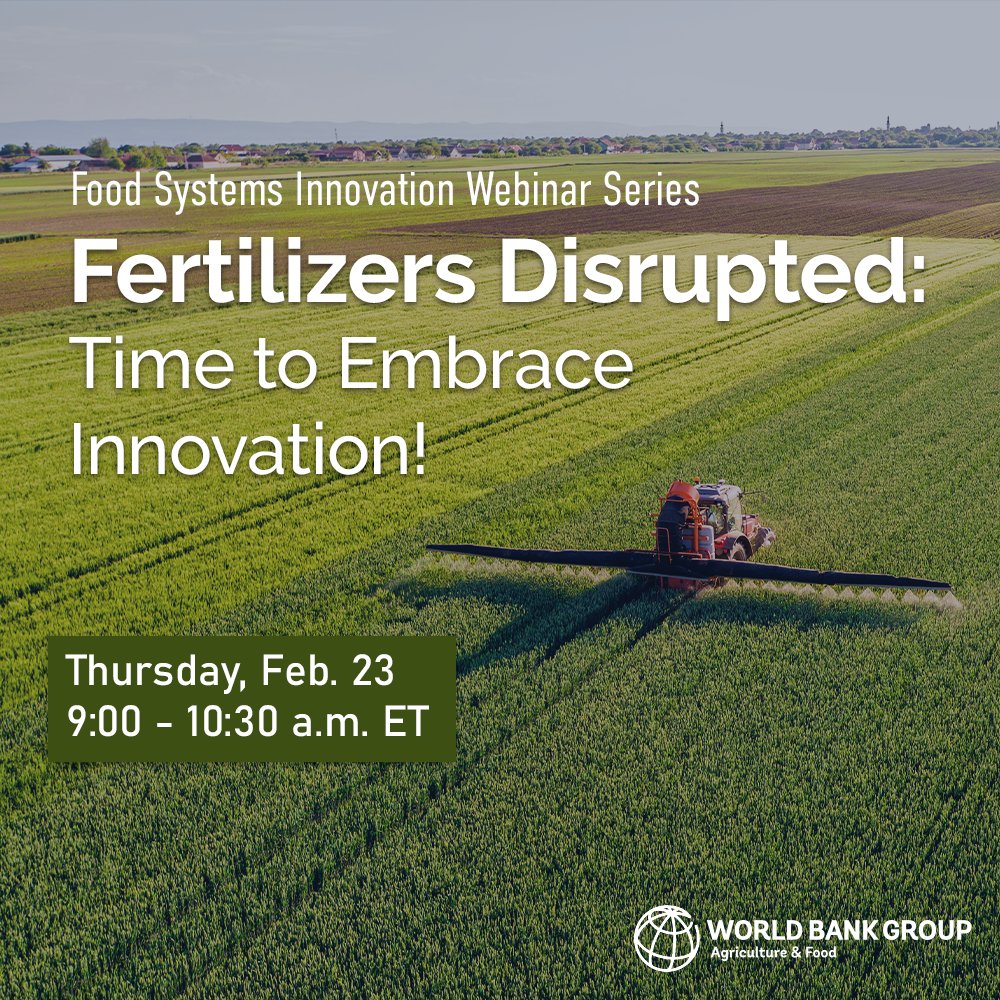This webinar from the World Bank is the first in this new series under the Food Systems Innovation webinar series and are dedicated at showcasing a range of innovations and discussing how the government can use and/or support the scaling up of these innovations for sustainable soil fertility management.
Recording forthcoming
Many options already exist, from a data-driven use of chemical fertilizers to innovations allowing decentralized production systems or move to a range of options of BioSolutions with microbial- or plant-based fertilizer, which have the potential to provide a viable long-term solution to these challenges.
- Moderator: Parmesh Shah, Global Lead, Data-driven Digital Agriculture, Agriculture and Food Global Practice, The World Bank
- Chakib Jenane, Practice Manager, West and Central Africa, Agriculture and Food Global Practice, World Bank
- Shobha Shetty, Practice Manager, East Africa (TBC)
- Julian Lampietti, Manager for Global Engagement, Agriculture and Food Global Practice, World Bank
- Sebastian Nduva, Program Lead, AFO, International Fertilizer Development Center (IFDC)
- Mandla Nkomo, Chief Growth Officer, Excellence in Agronomy Initiative, CGIAR
- Jeremy Cordingley, Founder/Managing Director, Crop Nutrition Laboratory Services (Cropnuts)
Cropnuts was established in 1998 and is Africa’s one of the leading laboratory for agricultural and environmental testing, providing a wide range of analytical services to farmers, businesses and smallholders. Cropnuts has developed detailed soil fertility maps for several African countries. These soil fertility maps typically cover large areas of land and reveal variations in the soil properties. These maps have been used by fertilizer blending companies and research institutions to develop specialist fertilizer blends for specific crops in different agro-ecological zones – a process that we call Smart Blending. - Nico Pinkowski, Co-founder, and CEO, Nitricity
- Bill Brady, Founding CEO and Director, Kula Bio
- Closing Remarks: Martien van Nieuwkoop, Global Director, Agriculture and Food Global Practice, The World Bank
Related:
IFDC (2023) 2023 Register of Fertilizer Manufacturing and Processing Facilities in Sub-Saharan Africa # 52 p
 This Register of Fertilizer Manufacturing and Processing Facilities in sub-Saharan Africa (SSA), excluding South Africa, monitors and maps all operational fertilizer producing plants, indicating the available name-plate production capacity in the region. The register also captures information on upcoming projects on fertilizer plant installations. The details are obtained by AfricaFertilizer.org (AFO) directly from fertilizer companies by use of questionnaires or from secondary data.
This Register of Fertilizer Manufacturing and Processing Facilities in sub-Saharan Africa (SSA), excluding South Africa, monitors and maps all operational fertilizer producing plants, indicating the available name-plate production capacity in the region. The register also captures information on upcoming projects on fertilizer plant installations. The details are obtained by AfricaFertilizer.org (AFO) directly from fertilizer companies by use of questionnaires or from secondary data. The AfricaFertilizer (AFO) initiative is the premier source for fertilizer statistics and information in Africa. Set up in 2009, AFO is hosted by the International Fertilizer Development Center (IFDC) and supported by several partners, including the International Fertilizer Association (IFA), on fertilizer trade and fertilizer use by crop studies, the Bill and Melinda Gates Foundation (BMGF) through Development Gateway (DG) as partner for data visualization, Argus Media as partner for international fertilizer prices, comments, and reports and USAID’s Bureau for Resilience and Food Security through the Feed the Future Soil Fertility Technology Adoption, Policy Reform, and Knowledge Management under the Sustainable Opportunities for Improving Livelihoods with Soils (SOILS) Consortium for monitoring tools such as the AfricaFertilizer Watch.



No comments:
Post a Comment